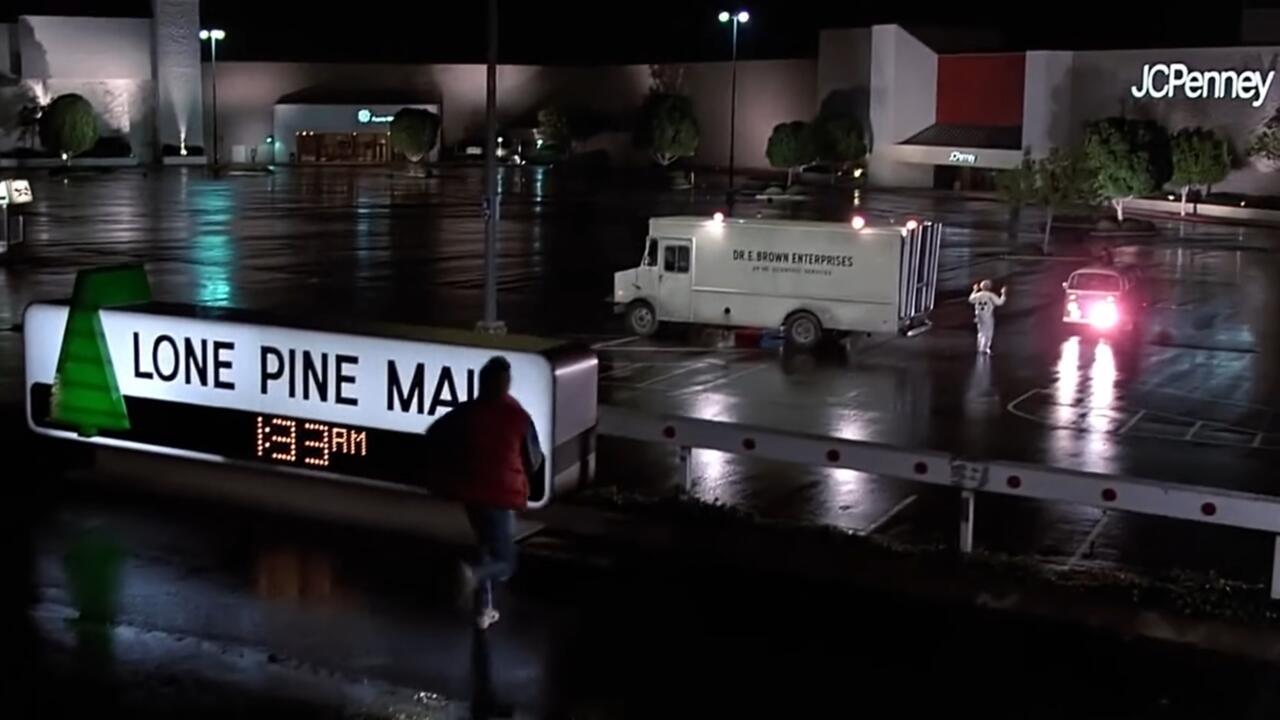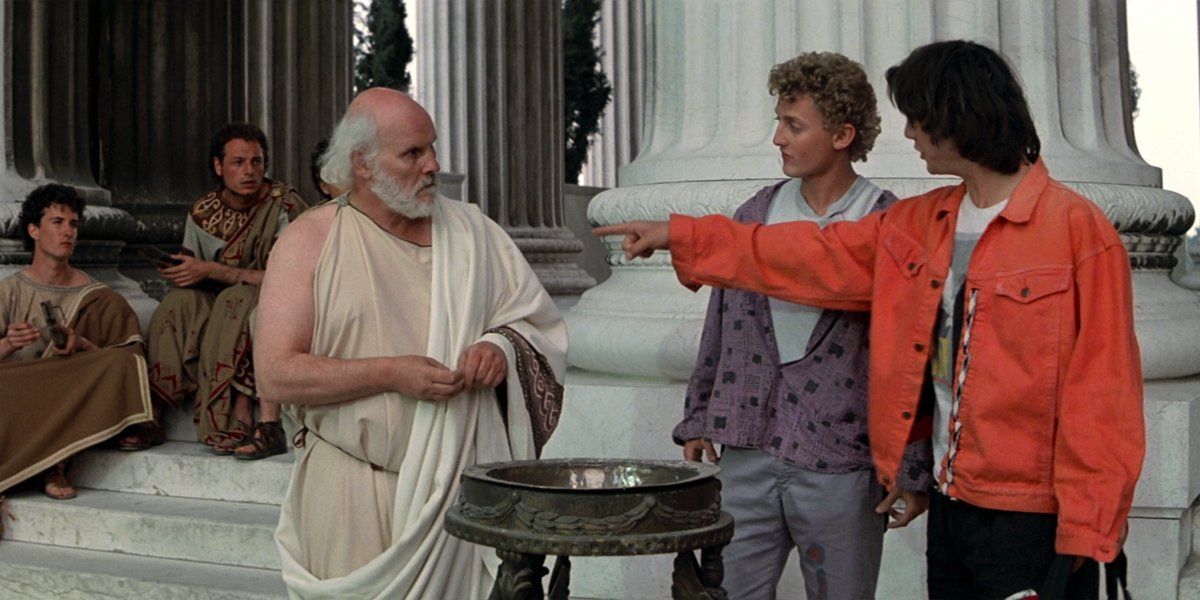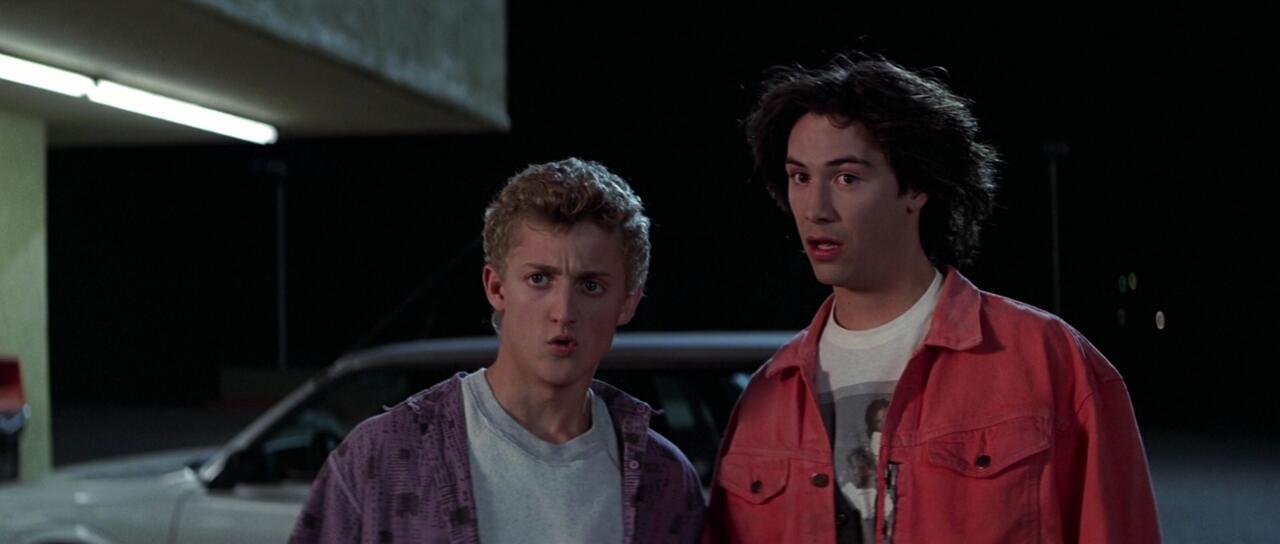Bill and Ted's Excellent Adventure is celebrating its 35th anniversary in 2024, having released in February 1989.
Whenever I watch time-travel movies, I find myself yelling at the screen a lot. You know how people shout at horror movie characters when they inexplicably head into the dark basement or wander alone into the woods to investigate a strange sound that's obviously coming from an eight-foot-tall monster? That's me, but I'm desperately trying to get Denzel Washington to understand his future self left that note in the past for his present self to find.
I've spent so much time thinking about how time travel movies and their characters mess up that I even wrote a book about it--So You Created a Wormhole: The Time Traveler's Guide to Time Travel--which I'm obligated to plug roughly once a year for the rest of my life.
Time-travel movies are notoriously convoluted, so much so that it feels like a trend has developed in more recent movies, like Looper, to skip over the ins and outs of how causality works when you're hopping between timelines, because it's just too technical and boring. A lot of time-travel movies, such as TimeCrimes, actually make hay from characters not realizing how time travel works until it's too late, and others, like Denzel's still-excellent Deja Vu, kind of flub the logic to make the story work.

But even some of the best time-travel characters, such as the world's greatest intern, Marty McFly, aren't actually very good at time travel. Marty gets a lot of help from Doc Brown, the guy who actually knows how these things work. Left to his own devices to use time travel to solve a problem, Marty uses the time machine in Back to the Future to return a mere 15 minutes before Doc's assassination by terrorists at the beginning of the movie. The guy even says, "I have all the time in the world, I have a time machine" and then gives himself basically no time at all to prevent his friend's murder. The need for dramatic stakes aside, Marty is not particularly adept at thinking fourth-dimensionally.
You know who the greatest time travelers in movies actually are? Bill S. Preston, Esq. and Ted "Theodore" Logan, specifically in Bill and Ted's Excellent Adventure.
Don't be fooled: Bill and Ted are not the exceedingly dumb but vacuously amiable surfer bros they appear to be. They may not be especially good at pronouncing unfamiliar names like Freud (who they call "the Frood dude"), Socrates ("So-crates"), or Beethoven ("Beeth-oven," which has forever ruined my ability to read his name without laughing), but unlike basically everyone else in time-travel film history, they have an exceptionally good grasp of the four-dimensional world.

Admittedly, the stakes are lower for Bill and Ted, who are trying to gather historical figures for a history class presentation, than they are for Denzel, who employs time shenanigans to stop a terrorist bombing. And Bill and Ted's mastery of causality isn't on display at all for most of the movie. The first two-thirds largely just concern the pair zipping back and forth through time and kidnapping/befriending people--it's more about visiting interesting historical moments than worrying about how actions in the past can cause ripples in the future. But then the guys hit a snag when they discover that, after leaving all their historical pals at the mall, they've all been arrested for various crimes of disturbing the shopping experience.
With time running out before their presentation, Bill and Ted have to figure out how to break all these temporal misfits out of the local jail. Ted's dad is the sheriff who owns a set of keys to the cells, but as is established earlier in the movie, he's lost them, shutting down the ability for Bill and Ted to steal them. When they game out the idea of jumping back in time to prevent the arrests or steal the keys in the past, they realize that they simply don't have time. As Rufus the time traveler explained at the start of the adventure, "the clock in San Dimas is always running," and they won't make it to their history report with another digression through time. And sure, the San Dimas timer is a movie thing to add tension and stakes that doesn't make a ton of sense, but it's a rule Excellent Adventure is consistent about, and the guys have to deal with it.
That's when Ted has one of the most incredible flashes of time traveler inspiration in all of moviedom. He realizes that he and Bill don't have to solve the key problem right now--they can use the time machine to solve it later. Ted theorizes that, after they've finished the report and there's no ticking clock for them to race, they can travel back in time to before Ted's dad lost the keys. Bill picks up the ball, realizing they can steal the keys and then leave them somewhere in the past where the pair will find them when they need them. Bill suggests they hide the keys behind the sign in front of the jail, and then reaches behind it--to find the keys waiting for him.
Bill and Ted understand nonlinear causality so well that they basically will those keys into existence.
The rest of the sequence sees Bill and Ted sneaking through the police station on their way to the lockup, with ever more help from the future to get them through. A fax appears at a key moment, instructing them to duck to avoid one officer. At another point, a trash can drops onto Ted's dad's head, covering his eyes and pinning his arms to his sides so the group can escape.
Throughout the whole scene, Bill and Ted act as their own Morpheus from The Matrix, guiding themselves through and helping out whenever necessary. It's a bit of a deus ex machina, sure--every problem is conveniently solved by exactly what needs to appear just as the problem does. But at the same time, the scene demonstrates the brains Bill and Ted themselves show as the movie develops. This whole situation is basically possible from having a really good memory, a ton of lateral thinking skills, and an excellent ability to look at cause and effect and understand how to bend it to your will.
Bill and Ted here are displaying a grasp of temporal reality that's rarely seen in a lot of stories, but they're in good company. Some of the seminal works of time travel sci-fi, like Robert Heinlein's "By His Bootstraps" and "All You Zombies," are similarly about the roundabout actions someone takes through time travel to create their own circumstances. In "By His Bootstraps," a character zips back in time to give himself a leg up at a crucial moment and make his own fortune, turning a guy who previously thought he lucked into everything into a self-made man. "All You Zombies" is decidedly weirder, but it works through similar ideas, and actually has a pretty solid movie adaptation that trades in characters both understanding and not understanding time travel in equal, believable measure.

The point is that, while most movies make their time travelers kind of dumb to make the conceits of a time-travel story work, it doesn't have to be this way. We time-travel fans don't have to be forced to shout at fictional characters to wise up about how their actions are leading them to tragically inexorable fates, which could be avoided if only they'd stop to think.
Sometimes, it's possible to go the other way, with characters who "get" time travel. Sometimes, you have Bill S. Preston, Esq. and Ted "Theodore" Logan.
